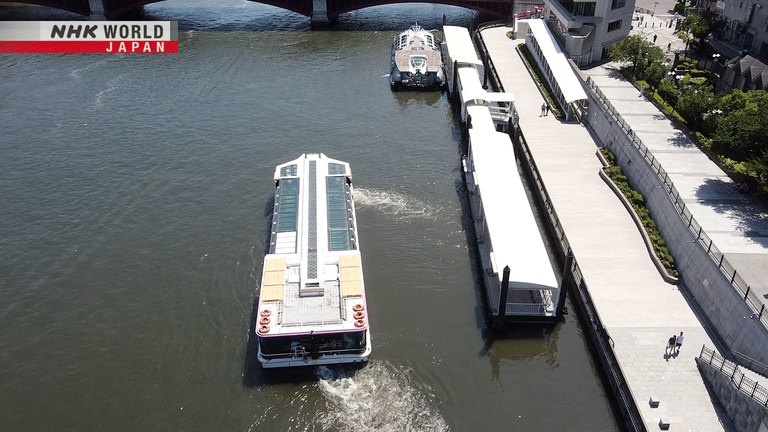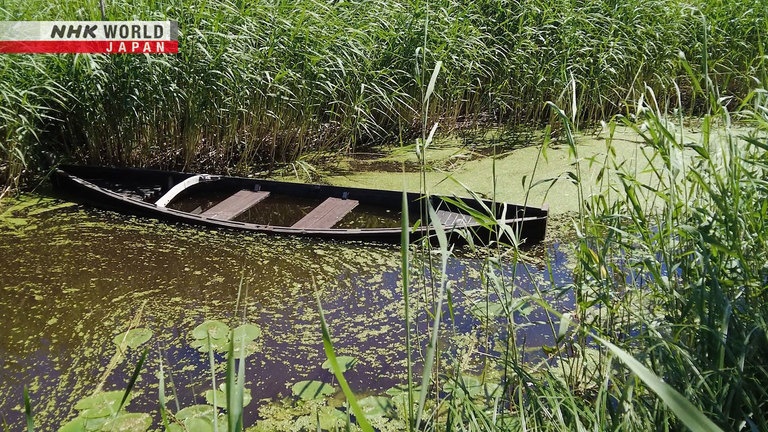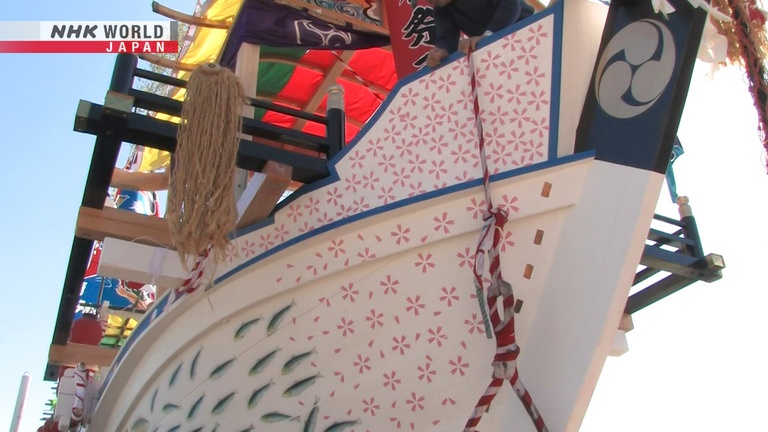Ship
The Japanese language is rich in words and expressions influenced by nature, history and culture. This episode focuses on ships and boats. Japan is an island nation, and ships have been an integral part of Japanese life. This is reflected in the many expressions related to ships and boats. From his home in Kyoto Prefecture, poet and literary translator Peter MacMillan guides us through these words and the culture behind them.




Transcript
"Yukigesyo."
"Karakurenai."
The Japanese language is rich in unique expressions that reflect nature and culture.
Magical Japanese.
Today's theme is "fune," or ships and boats.
Japan is an island nation surrounded by the sea.
Since ancient times, people have used ships for travel and commerce, both within Japan and with other countries.
Ships are an integral part of Japanese life.
Hello, I'm Peter MacMillan.
In many large cities in Japan, you will see ships coming in and out of port.
Tokyo and Osaka are both coastal cities which had advanced canal systems that influenced their development.
Let's have a look at some phrases in Japanese related to ships and boats.
"funade."
"Fune" changes to "funa" when followed by another word.
Here it's combined with "de," meaning "to depart."
"Funade" literally means going out to sea on a boat.
It is also used to describe the launch of auspicious events, such as the birth of a company, or the beginning of a new chapter in life.
One might say, "Congratulations on your marriage! All the best on your ‘funade' - next chapter."
"funade."
"kaji o toru."
This translates as "take the helm."
As in the English expression, it means to take leadership in managing a project or plan to achieve a goal.
It seems she will "kaji o toru" - take the helm - on the project.
"kaji o toru."
"kaji o kiru."
This means to steer a ship and change direction.
It's also used figuratively when an entity such as a business makes major organizational or policy changes.
Our company will "kaji o kiru" - drastically change course - from manufacturing to content creation.
"kaji o kiru."
Boats are not just used to transport people or things.
Aristocrats in the Heian Period from the 8th to 12th centuries used to use boating as a form of entertainment, to admire cherry blossoms and the changing leaves, to read poetry, or to play instruments.
To aristocrats, boats were a place of elegance, a place to show off the knowledge gained from their daily studies.
There is a poem that depicts this.
"Haru no hi no, urara ni sashite, iku fune wa, sao no shizuku mo, hana zo chirikeru."
On this balmy day as the boat rows on in sparkling spring light, pearl drops of water scatter from the oars like blossoms.
This poem depicts the tranquility of spring on a boat as it rows along the waters.
This type of boating for pleasure eventually spread to commoners.
You can still experience this today by cruising on a traditional Japanese houseboat.
"yakatabune."
"Fune" becomes "bune" when preceded by another word.
A "yakatabune" is a kind of pleasure boat with a "yakata," or roofed structure.
Such vessels are mainly used for excursions on rivers and along the coast.
Inside are "tatami" mats, where passengers can relax and enjoy meals.
Viewing fireworks from a "yakatabune" is popular in the summer.
Pleasure rides on "yakatabune" date back to the Edo period.
They're one way that Japan's food culture and customs of old have sailed on to the present day.
Would you like to ride one of these boats?
Do they seem a bit scary to you?
No worries, "obune ni notta tsumoride."
"obune ni notta tsumoride."
O ("Oh") means large, or big.
This phrase literally means, "as if you're on a large boat."
Since bigger ships have a lower risk of capsizing, the expression is used to describe a sense of security.
It's used, for example, when someone you trust has taken charge, or a point of concern has been solved.
I will take the lead on this project.
You can relax and follow me, "obune ni notta tsumori de" - as if you're on a large boat.
"obune ni notta tsumori de."
"dorobune."
This literally means "a boat made of mud," and is used to describe something that could sink or collapse at any moment - for example, a company on the verge of bankruptcy, or a group that's so riddled by conflict it's about to break up.
"dorobune."
There are good and bad expressions related to ships and boats.
Boats and ships are made to carry people and things, but to the Japanese, they have been considered as carriers of happiness since ancient times.
"takarabune."
"Takara" means treasure.
"Takarabune" specifically means a ship loaded with gold, silver, and other precious items.
Ancient Japanese believed that happiness comes from the end of the sea.
In old Japanese books, there is a story about gods living in another world at the far reaches of the sea.
It was said that these gods would give people wisdom.
And when people died, they'd become spirits and travel to the world of the gods and live forever.
"takarabune."
Let's look at some words associated with good luck.
"watari ni fune."
"Watari" means to cross a river or road.
In the olden days, crossing the river by boat was the norm.
"Watari ni fune" means there is a boat waiting for you exactly when you need it.
In modern times, it's used when necessary or desirable conditions are met at the right time and in the right place.
For example: They happened to be searching for a business partner, so it was "watari ni fune" - perfect timing - and they eagerly signed the contract.
"watari ni fune."
"junpu manpan."
This means that the ship is moving along effortlessly, with a tailwind filling the sails.
It's used when things are going very smoothly.
I fulfilled my dream of studying overseas, and even found a job and the love of my life there.
"junpu manpan." Things are going smoothly.
"junpu manpan."
The journey of life is like a voyage through the sea - sometimes the waves are rocky...
but we all hope for a safe passage, right?
But the journey to learn Japanese is fun.
I hope you enjoy this journey!
See you next time.
Bye!